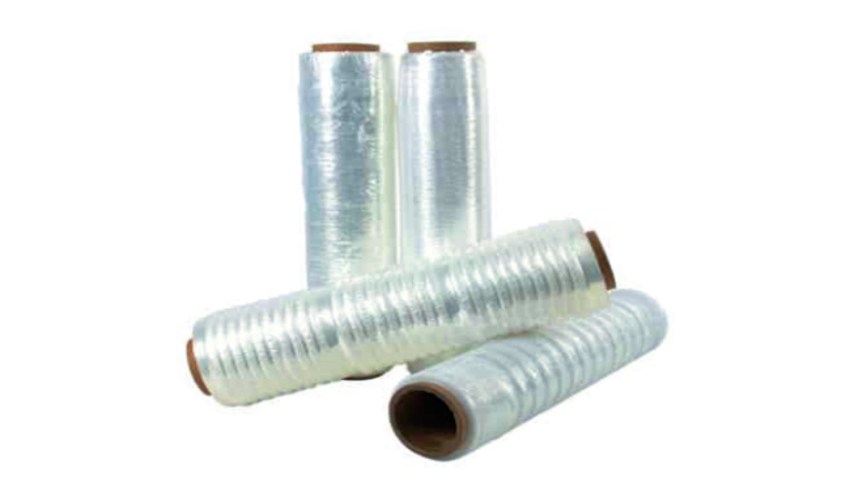
Biodegradable shrink wrap is an innovative packaging solution that offers an eco-friendly alternative to traditional plastic shrink wrap. Unlike conventional plastic, which can take hundreds of years to decompose, biodegradable shrink wrap is designed to break down more quickly and safely when exposed to environmental conditions. This type of shrink wrap is made from renewable resources and is compostable, reducing its environmental impact. As more industries recognize the damaging effects of plastic waste, the demand for biodegradable alternatives is growing rapidly. Biodegradable shrink wrap helps mitigate pollution, offering a sustainable solution for packaging needs across various sectors, from food packaging to boat coverings.
Biodegradable shrink wrap is increasingly being used as an environmentally-friendly packaging option for food products. This type of shrink wrap offers a sustainable alternative to traditional plastic wraps that are commonly used in the food industry. Unlike conventional plastic, which can remain in landfills for years, biodegradable shrink wrap breaks down naturally over time, reducing its environmental footprint. Additionally, there are several alternatives to shrink wrap for pallets, such as stretch film made from recycled materials, eco-friendly pallet wraps, and paper-based packaging. These alternatives provide businesses with options to minimize their reliance on single-use plastics and further enhance sustainability in their packaging practices.
Biodegradable shrink wrap is utilized in various food packaging applications, such as:
Using stretch film biodegradable for food packaging offers several significant advantages:
For food-related applications, biodegradable stretch film must meet specific certifications and standards to ensure safety and suitability:
Biodegradable shrink wrap is becoming an increasingly popular choice in the marine industry, particularly for covering boats during winterization. This eco-friendly alternative to traditional plastic shrink wrap offers boat owners and marinas a sustainable solution for protecting their vessels while minimizing environmental impact.
In the marine industry, biodegradable shrink wrap is primarily used for protecting boats during the off-season, particularly in colder climates where boats need protection from harsh weather conditions. The shrink wrap provides a tight, protective barrier that shields the boat from:
Biodegradable shrink wrap offers a safer, more eco-conscious option for boat owners looking to protect their vessels without contributing to long-term plastic waste.
Using biodegradable shrink wrap for boat covers comes with several distinct environmental benefits:
Proper disposal and recycling of biodegradable shrink wrap are essential to ensure its environmental benefits are fully realized. While biodegradable shrink wrap breaks down more quickly than traditional plastic, it still requires proper handling to prevent contamination and ensure safe disposal:
By following proper disposal guidelines, boat owners can ensure that their use of biodegradable shrink wrap contributes to a cleaner, more sustainable marine environment.
Biodegradable shrink wrap bags are an innovative packaging solution that use biodegradable shrink wrap materials to create a sustainable alternative for packaging various products. These bags provide an eco-friendly option for industries looking to reduce their environmental impact while still maintaining the protection and security that shrink wrap offers.
Biodegradable shrink wrap bags are designed to fit around products like traditional plastic shrink wrap, but with the added advantage of being made from biodegradable materials. The shrink wrap bags are used to securely encase products, providing protection from dirt, moisture, and damage during storage or shipping. Unlike conventional plastic bags, these biodegradable versions are designed to break down naturally over time, reducing the amount of plastic waste in landfills and oceans.
Biodegradable shrink wrap bags offer several notable advantages over traditional plastic packaging:
Biodegradable shrink wrap bags are commonly used in a variety of industries due to their versatility and eco-friendly properties:
These applications demonstrate how biodegradable shrink wrap bags are not only beneficial for the environment but also offer practical, reliable solutions for a wide range of industries.
Oxo biodegradable stretch film represents a new innovation in the world of biodegradable shrink wrap, designed to offer a more eco-friendly alternative to traditional plastic films. Unlike conventional biodegradable films, oxo biodegradable stretch film incorporates an additive that accelerates the degradation process, helping it break down more quickly in the presence of oxygen. This film is especially useful for businesses and industries looking for a sustainable solution to packaging and shipping while reducing plastic waste.
Oxo biodegradable stretch film is a type of plastic film that has been enhanced with an additive, often referred to as an “oxo-degradable” agent, which promotes the film’s breakdown once exposed to oxygen. This contrasts with traditional biodegradable shrink wrap or biodegradable plastic stretch wrap, which typically decomposes through natural microbial processes. The key difference lies in the way the oxo-degradable additive facilitates a faster degradation when the film is exposed to the environment, allowing it to break down in a matter of months rather than years.
Oxo biodegradable stretch film is still made from polyethylene, which is a type of plastic, but its ability to degrade more rapidly makes it a more environmentally friendly option compared to regular plastic films that persist in landfills for hundreds of years. The additive accelerates the oxidation process, causing the plastic to fragment and degrade into smaller, non-toxic particles.
Oxo biodegradable stretch film offers several important environmental benefits, including:
Oxo biodegradable stretch film has several common applications across various industries, particularly where packaging, shipping, and warehousing are involved. These include:
This innovative film offers businesses a viable alternative to traditional plastic, reducing their environmental impact while maintaining the protective qualities of regular shrink wrap.
Wholesale biodegradable shrink wrap is rapidly becoming a go-to packaging solution for businesses seeking a cost-effective, environmentally friendly alternative to traditional plastic films. As more companies aim to meet consumer demand for sustainable products and reduce their carbon footprint, biodegradable stretch film offers an innovative option for packaging and shipping needs. By purchasing in bulk, businesses can make a significant impact on both their operational costs and environmental responsibility.
The rise of wholesale biodegradable stretch film reflects the growing demand for sustainable packaging options across various industries. As more businesses recognize the environmental impact of plastic waste, particularly in the shipping and packaging sectors, biodegradable stretch film factory offers an appealing solution. By purchasing biodegradable stretch film wholesale, companies not only reduce their reliance on harmful plastic but also align with global trends toward eco-conscious manufacturing and logistics practices. Bulk purchasing provides businesses with cost savings while supporting sustainability goals, offering a practical, scalable option for packaging.
Businesses can experience several advantages when opting for wholesale biodegradable stretch film, including:
The demand for biodegradable stretch film is rapidly growing as both consumers and industries seek more environmentally responsible packaging solutions. Key factors driving this demand include:
Wholesale biodegradable stretch film offers a cost-effective and sustainable solution for businesses looking to reduce their environmental impact while maintaining efficiency and protecting their products. The growing market demand for such packaging alternatives reflects a broader shift towards sustainability, with companies investing in biodegradable options to meet both regulatory requirements and consumer expectations.
Biodegradable stretch film suppliers are at the forefront of the push toward more sustainable packaging solutions. These companies are leading the way in the development and production of biodegradable shrink wrap, providing businesses with an eco-friendly alternative to traditional plastic films. As demand for sustainable packaging grows, manufacturers are focused on creating high-quality, durable, and environmentally responsible stretch films that can help reduce plastic waste and minimize the environmental footprint of packaging across various industries. This shift also helps address the growing issue of stretch film waste, which has long been a challenge for waste management, by offering a more biodegradable option that breaks down more quickly in landfills and reduces long-term pollution.
Biodegradable stretch film manufacturers play a crucial role in the packaging industry by producing stretch films that are made from renewable materials and designed to degrade more quickly than conventional plastic films. These biodegradable alternatives provide the same protective qualities of traditional stretch film while reducing environmental impact. As the demand for eco-friendly solutions grows, biodegradable stretch films are increasingly seen as a viable stretch film alternative, offering businesses a way to meet sustainability goals without compromising performance. The development of biodegradable shrink wrap is one of the key steps toward achieving more sustainable packaging practices, making it an attractive option for businesses looking to enhance their environmental credentials.
Biodegradable stretch film manufacturers are continually innovating to improve the strength, durability, and environmental benefits of biodegradable shrink wrap. Key innovations include:
Through these innovations, biodegradable stretch film factories are helping businesses transition away from traditional plastic packaging, offering a sustainable alternative that meets both operational and environmental goals.
Yes, biodegradable shrink wrap is now available as an eco-friendly alternative to traditional plastic shrink wrap. Unlike conventional plastic, which can take hundreds of years to break down in the environment, biodegradable shrink wrap is made from renewable, plant-based materials that degrade naturally over time. This type of shrink wrap is designed to provide the same protective qualities as plastic shrink wrap—such as securing products during shipping and storage—while being less harmful to the environment.
Biodegradable shrink wrap is produced from materials like cornstarch, sugarcane, or other plant-based polymers, and it breaks down through microbial activity once exposed to soil or compost. There are also various biodegradable stretch films that serve the same purpose. Many manufacturers are now adopting biodegradable options in response to growing environmental concerns and consumer demand for more sustainable packaging solutions.
While biodegradable shrink wrap offers significant environmental benefits, it is important to ensure proper disposal methods, such as composting or recycling, to fully realize its eco-friendly potential. However, this type of shrink wrap is still relatively new to the market, and ongoing research and development are focused on improving its durability, performance, and affordability.
Traditional shrink wrap, typically made from plastic like PVC (polyvinyl chloride) or LDPE (low-density polyethylene), is indeed bad for the environment, primarily because it is non-biodegradable. Once used, shrink wrap can sit in landfills for decades or even centuries without breaking down, contributing to plastic pollution. The environmental impact is also compounded by the fact that plastic waste often ends up in oceans and waterways, posing a threat to marine life and ecosystems.
Another issue is that the production of plastic shrink wrap relies on petroleum-based resources, which are non-renewable. The extraction and processing of petroleum contribute to greenhouse gas emissions and other environmental harms. Moreover, most plastic shrink wrap is not easily recyclable, leading to further waste accumulation.
That said, the growing awareness of these environmental concerns has led to the development of biodegradable alternatives. Biodegradable shrink wrap is designed to reduce plastic waste, break down more quickly in the environment, and lessen the overall environmental impact of packaging. However, even biodegradable films require proper disposal and recycling to maximize their benefits.

My name is James Thompson, and I’m the editor of this website dedicated to Stretch Film, Pallet Wrap, and Stretch Wrap products.
My passion for packaging began when I noticed the challenges companies face in securing their products efficiently for transportation and storage. This inspired me to delve deep into the world of stretch films and pallet wraps, exploring the latest technologies and best practices.
I aim to provide valuable insights, practical tips, and up-to-date industry trends to assist you in making informed decisions. Whether you’re a small business owner or part of a large corporation, my goal is to support you in optimizing your operations and ensuring your products reach their destination safely.
Thank you for visiting, and I look forward to accompanying you on your journey toward better packaging solutions.
Comments are closed